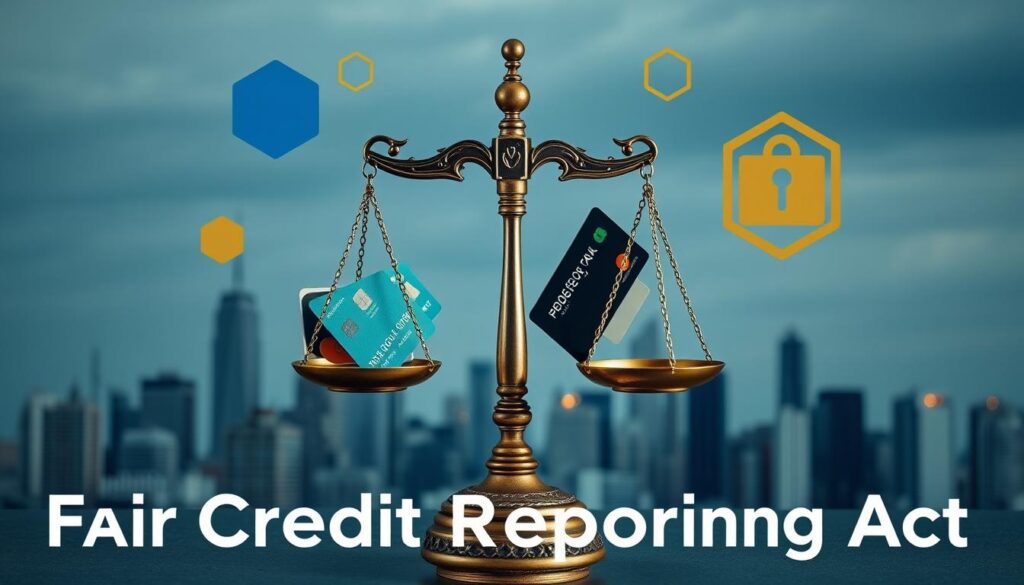A healthy credit profile is crucial for many life aspects. It affects loan terms, apartment rentals, and even job opportunities. Ensuring your credit report’s accuracy is vital for managing your finances.
Closed accounts can linger on your report, impacting your creditworthiness. This guide will help you remove these accounts effectively. You’ll learn how to reclaim your financial standing and improve your credit profile.
Key Takeaways
- Understand the importance of credit reports and how closed accounts can impact your credit score
- Learn what closed accounts are and why you should remove them from your credit report
- Discover your rights under the Fair Credit Reporting Act and how to leverage them
- Gather the necessary information and documents to craft a compelling dispute letter
- Craft an effective dispute letter to request the removal of closed accounts from your credit report
- Follow up on the dispute process and ensure the successful removal of closed accounts
- Maintain a healthy credit profile by monitoring your credit report regularly
Understanding the Importance of Credit Reports
Credit reports show your financial history in detail. They help create your credit score, which shows how trustworthy you are with money. Lenders use this info to decide if they’ll give you credit.
Your credit score affects your loan approvals and interest rates. It also impacts your credit limits. A good score can open doors to better financial deals.
Credit Score Impact
Your credit score is a key factor in your financial options. It reflects your credit history and shows lenders how reliable you are. Higher scores usually mean lower risk and better loan terms.
Lender and Creditor Decisions
Lenders closely review your credit report before lending money. They use it to gauge the risk of lending to you. This affects loan approvals, credit cards, and even rental applications.
Your report also influences interest rates and credit limits. A good credit profile can help you get better financing options. It’s crucial for securing the best terms from lenders.
Understanding your credit report and credit score is important. It helps you make smart money choices. This knowledge can help build a strong financial future.
| Credit Score Range | Credit Rating | Typical Interest Rates |
|---|---|---|
| 800-850 | Excellent | Lowest available rates |
| 740-799 | Good | Favorable rates |
| 670-739 | Average | Moderate rates |
| 580-669 | Fair | Higher rates |
| 500-579 | Poor | Highest available rates |
“Your credit report is the key to unlocking financial opportunities. Understand its impact and use it to your advantage.”
What Are Closed Accounts on Credit Reports?
A healthy credit profile is vital for financial success. Closed accounts are a key part of your credit report. Understanding their impact can help you manage your credit better.
Closed accounts are credit cards or loans that you’ve paid off. These can stay on your credit report for up to 10 years. Even closed, they still affect your credit score and overall creditworthiness.
Having closed accounts isn’t always bad. It can show you manage money well. However, lenders may view these accounts differently. That’s why it’s important to know how they impact your credit report.
| Closed Account Impact | Potential Implications |
|---|---|
| Credit Utilization Ratio | Closed accounts can influence your credit utilization ratio, which is a key factor in determining your credit score. This ratio measures the amount of credit you’re using compared to the total credit available to you. |
| Credit History Length | The length of your credit history is another important factor in your credit score calculation. Closed accounts may shorten the overall history, potentially impacting your score. |
| Lender Perceptions | Lenders and creditors may view closed accounts as a sign of financial instability or irresponsibility, which could affect their decision-making process when evaluating your creditworthiness. |
Knowing how closed accounts affect your credit report is crucial. This knowledge helps you make smart financial choices. You can take steps to address any issues that come up.
Why Remove Closed Accounts From Credit Reports?
Removing closed accounts from your credit report offers key advantages. It can boost your credit utilization ratio, a vital factor in your credit score. This simple action may lead to improved financial standing.
Improved Credit Utilization
Credit utilization is a major part of your credit score. It shows how much available credit you’re using. Closed accounts can make this ratio look worse than it really is.
By removing these accounts, you can lower your credit utilization. This could potentially raise your credit score.
Simplified Credit History
A clear credit history helps lenders understand your finances better. Removing closed accounts makes your record more straightforward. This allows for more accurate assessment of your creditworthiness.
Taking time to remove closed accounts can greatly benefit you. It improves your credit utilization and simplifies your credit history. These changes can lead to better credit decisions from lenders.
Ultimately, this process can help you reach your financial goals. It paves the way for more favorable outcomes in your credit journey.
The Fair Credit Reporting Act and Your Rights
The Fair Credit Reporting Act (FCRA) protects consumers’ rights in credit reporting. You can dispute wrong info on your credit report, including closed accounts. This law lets you ask for removal of closed accounts hurting your credit score.
The FCRA gives you important consumer rights. You can get a free yearly credit report from each major bureau. You can challenge errors on your report and have them fixed.
The law requires you to be told when negative info is added. It also mandates removal of old negative data after a set time.
- The right to access your credit report from each of the three major credit bureaus (Experian, Equifax, and TransUnion) for free once a year.
- The right to dispute any errors or inaccuracies in your credit report, including closed accounts, and have them investigated and corrected.
- The right to be notified whenever negative information is added to your credit report, such as a late payment or a closed account.
- The right to have outdated negative information, like a closed account, removed from your credit report after a certain time period.
Using your FCRA rights helps keep your credit report healthy. It allows you to manage your credit score, even with closed accounts or disputes.

“The FCRA is a powerful tool that empowers consumers to ensure the accuracy and fairness of their credit reports.”
Gathering Information for the Dispute Letter
Disputing closed accounts on your credit report requires specific information and documentation. This step is vital for crafting an effective dispute letter. Gathering the right details will help you remove those closed accounts.
Identifying Closed Accounts
Review your credit report to find the closed accounts you want removed. Note the creditor name, account number, and closure date for each account. These details are essential for your dispute letter.
Collecting Supporting Documents
Gather documents that support your case for removing closed accounts. This may include:
- Statements or correspondence from the creditor confirming the account closure
- Payment history or receipts demonstrating your timely payments
- Letters or emails exchanged with the creditor regarding the account closure
These documents provide evidence to support your dispute. They can increase your chances of a positive outcome.
Thorough preparation sets the stage for a compelling dispute letter. It helps you challenge closed accounts on your credit report effectively. Your careful groundwork will lead to better results in improving your credit report.
Writing an Effective Dispute Letter
A strong dispute letter is key for removing closed accounts from your credit report. It’s your official message to credit bureaus. This letter outlines issues and demands account removal.
A smart approach can boost your chances of success. Follow these tips to craft a compelling letter that gets results.
Key Components
A good dispute letter should have these elements:
- Your personal information, such as name, address, and contact details
- A detailed description of the closed accounts you want removed from your credit report
- Specific reasons for the dispute, such as the accounts being inaccurate or outdated
- A clear request for the credit bureaus to investigate and remove the closed accounts
- Copies of any supporting documentation, such as account statements or letters from creditors
Tone and Language
Your letter’s tone and language can greatly affect the credit bureaus’ response. Stay professional and polite throughout. Avoid using aggressive or confrontational words.
Use clear, brief wording to get your message across. Your goal is to present a solid dispute letter.
This will urge credit bureaus to act on your account removal request. It will also help address the credit report dispute in your favor.
“A well-crafted dispute letter can be the key to successfully removing unwanted closed accounts from your credit report.”

Letter to Remove Closed Accounts From Credit Report
Removing closed accounts from your credit report is vital for a healthy credit profile. A well-structured letter can effectively communicate your request to credit bureaus. This approach increases the chances of removing closed accounts from your report.
We’ve prepared a sample letter template to help you. It includes all the necessary elements to make your request clear and compelling.
Key Components of the Letter
- Identification of Closed Accounts: Clearly list the specific closed accounts you want removed from your credit report, including the account numbers and the dates they were closed.
- Explanation of Impact: Explain how the presence of these closed accounts is negatively impacting your credit score and overall credit history.
- Request for Removal: Firmly state your request for the credit bureaus to remove the closed accounts from your credit report.
- Supporting Documentation: Gather and include any relevant documentation, such as account closure statements or correspondence with the lenders, to support your request.
- Contact Information: Provide your full name, current address, and the best way for the credit bureaus to reach you regarding the status of your request.
“Removing closed accounts from your credit report can have a significant impact on your overall credit profile, potentially leading to a higher credit score and better lending decisions.”
Use this structured approach to craft a persuasive letter to remove closed accounts from your credit report. This method will help streamline the account removal request process.
Stay organized and gather all necessary documentation when dealing with credit reporting systems. Be polite yet firm in your communication with credit bureaus. A well-crafted letter is a crucial step towards maintaining a strong credit profile.
Sending the Dispute Letter
After drafting your letter to remove closed accounts, it’s time to send it. You’ll need to contact Experian, Equifax, and TransUnion separately. These are the three major credit bureaus in the United States.
Contacting Credit Bureaus
To start the credit report dispute process, you must reach out to each bureau. Here’s how to contact them:
- Experian: You can submit your dispute online at www.experian.com, by mail at Experian, P.O. Box 4500, Allen, TX 75013, or by phone at 1-888-EXPERIAN (1-888-397-3742).
- Equifax: You can submit your dispute online at www.equifax.com, by mail at Equifax Information Services LLC, P.O. Box 740256, Atlanta, GA 30374-0256, or by phone at 1-866-349-5191.
- TransUnion: You can submit your dispute online at www.transunion.com, by mail at TransUnion Consumer Solutions, P.O. Box 2000, Chester, PA 19016-2000, or by phone at 1-800-916-8800.
Include all necessary information and supporting documents with your request. This will help speed up the account removal process. It also increases your chances of a successful credit report dispute.

“Taking the time to properly dispute any inaccurate or outdated information on your credit report can have a significant impact on your overall credit health.”
Following Up on the Dispute Process
After submitting your dispute letter, it’s vital to track its progress. Credit bureaus must investigate and respond within 30-45 days. Keep an eye on this timeline.
Ensure your request is handled correctly. This follow-up step is crucial for removing closed accounts from your credit report.
Resolving Disputes
If the credit bureau’s response is unsatisfactory, you have options. You can take steps to resolve the dispute effectively.
- Review the credit bureau’s findings: Carefully examine their investigation results. Look for any inconsistencies or errors in their response.
- Submit a follow-up dispute: If you disagree with their decision, send another dispute. Include new evidence to strengthen your case.
- Escalate to the Consumer Financial Protection Bureau (CFPB): File a complaint if the bureau doesn’t resolve your issue. The CFPB can help mediate your credit report dispute.
- Consult with a credit repair specialist: For complex cases, seek professional help. They can guide you through the account removal process.
Stay persistent and document everything thoroughly. This approach is key to resolving credit report issues.
Keep fighting to remove inaccurate or outdated closed accounts. Your efforts can lead to a more accurate credit report.
“The most important thing is to never give up. Keep fighting for your rights and don’t let the credit bureaus take advantage of you.”
Maintaining a Healthy Credit Profile
Removing closed accounts from your credit report is vital. It’s also crucial to maintain a healthy credit profile. Focus on responsible credit management to build a strong credit score.
Keep your credit utilization low for a healthy credit profile. Use less than 30% of your available credit. Pay all bills on time, as payment history greatly impacts your credit score.
Monitor your credit reports regularly. Look for discrepancies or inaccuracies and address them quickly. This helps identify and resolve issues before they worsen.
- Maintain a low credit utilization ratio, ideally under 30%
- Pay all your bills on time to build a positive payment history
- Regularly monitor your credit reports for any errors or discrepancies
Following these strategies will help you manage your credit profile effectively. You’ll maintain a strong credit score and set yourself up for financial success.

Conclusion
Removing closed accounts from your credit report can boost your credit score and financial health. Know your rights under the Fair Credit Reporting Act. Gather necessary information and write an effective dispute letter to improve your credit profile.
Keep a healthy credit history and regularly check your credit reports. Addressing closed accounts is key to credit repair. It helps you reach financial goals and maintain stability.
Take charge of your credit report by removing unwanted closed accounts. This can lead to a brighter financial future. Improving your credit score opens doors for personal and professional growth.

